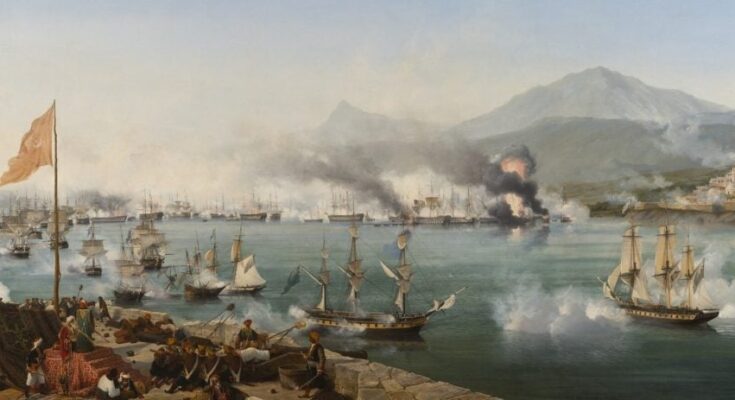
The Battle of Navarino, one of the most important battles in Greece’s War of Independence, took place on October 20, 1827.
It was on this date that a coalition of united European powers defeated the Ottoman-Turkish naval forces in the area of Navarino off the Peloponnesian peninsula.
After almost four centuries of Ottoman rule, the Greeks revolted and fought bravely against their occupiers.
The Greek Revolution was viewed sympathetically by many European powers and especially the people of France, Britain, and Russia, which sent considerable forces to assist the revolt in Greece.
The Russians, who shared the same Orthodox Christian faith with the Greeks, were very favorable to the Greek cause for an independent Christian state along the shores of the Aegean.
The Russian Tsar believed that he had a duty to support his Orthodox Christian brethren against the Ottomans, who were old enemies of the Russian Empire.
At the same time, Western Europe’s most powerful nations, France and Britain, were not keen on the Ottoman Empire gaining a strong foothold in Europe and were therefore also sympathetic to the Greek cause in hopes of promoting their own national interests in the region.
By 1827, six years after the revolution began, the rebellious but outnumbered Greeks found themselves exhausted, both physically and mentally.
The Ottoman Turks believed that this was the time to crush the Greek rebellion once and for all.
For this reason, the Ottoman authorities sought to gain support from Egypt, which was nominally part of the Ottoman Empire but was in practice independent and under the rule of Muhammed Ali.
The presence of Egyptian army forces in European seas and on the soil of the continent provoked outrage and led the great European powers to form an alliance to help the Greeks attain their freedom, as Ottoman practices were now seen as unacceptable.
The great nations of Britain, France, and Russia joined forces and sent naval ships to the Ionian Sea, situated between modern Italy and Greece.
Their decision to attack the Ottoman fleet at Navarino Bay was made by British Admiral Sir Edward Codrington, in cooperation with the French and in consultation with Greece’s first governor, Ioannis Kapodistrias.
London and Paris wanted to secure Greek autonomy in the region and bind Russia by treaty as a check on her own expansionist tendencies in the Mediterranean. In turn, Russia wished to take over Ottoman territories and therefore saw this battle as an opportunity to weaken their Turkish enemies.
It is now known that the allied European forces hoped that the sight of a united European front against the Ottomans would persuade the Turks to end their occupation of Greece without even fighting.
However, the Turks and their Egyptian counterparts did not budge.
They decided instead to confront the allies’ naval squadrons, hoping that a victory there would end Greece’s dreams for an autonomous state or one that was independent from the Ottomans in any case.
The two opponents met off the coast of the Peloponnesian town of Navarino in what is nowadays officially known as Pylos.
Battle was one of the most important in the Greek War of Independence
Turkish ships fired first on the allied European ships, commencing the Battle of Navarino. This was a development not welcomed by many but something that was about to become one of the most crucial battles in the Greek War of Independence.
Although the Ottomans attacked first, the Allies’ ships were superior and their guns had longer ranges. Codrington’s ship led the counterattack soon after the first shot, and, within hours, the superior artillery of the European forces utterly destroyed the Turkish and Egyptian armada.
The devastating defeat of the Turks was so complete that they lost control of seas that had been in their possession for centuries, as the Ottoman Empire had controlled most of the Mediterranean Sea from the eastern coasts of Italy all the way to the Middle East.
The Ottomans’ defeat in Navarino was so devastating that their position in Greece was now substantially eroded, putting their presence there under immediate threat.
While they continued their efforts to militarily control the geographical region of Greece, the Ottomans had inexorably lost the upper hand.
The Ottoman forces were ultimately forced to abandon the region a few years later, with Greece finally gaining its independence for the first time after the fall of the Byzantine Empire.



